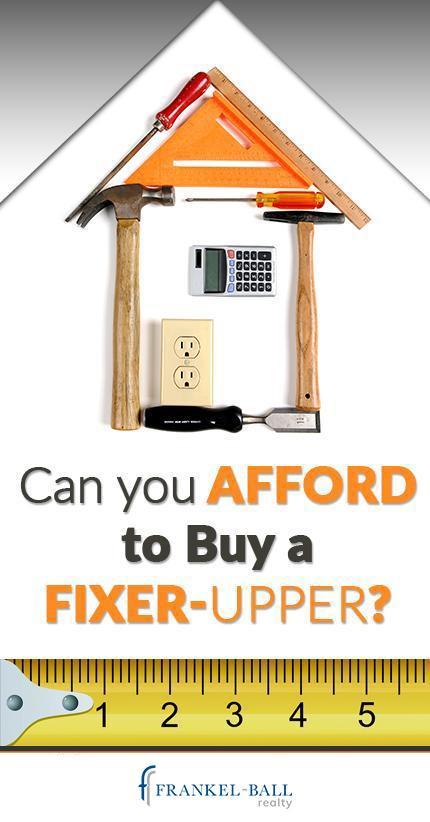Can you Afford to Buy a Fixer-Upper?
Posted by Lorna Rafferty on Thursday, August 25th, 2016 at 11:07am. 6245 Views

Some people want nothing to do with homes that aren’t move-in ready. Then there’s the group of folks that live to fix things. In many cases, these people look at run-down or dated houses and immediately get ideas in their heads about how they can make them better. For some, the worse the house, the more attractive it is to them. They’re ready to go to work!
If you’re one of those people, perhaps you’ve thought about buying a fixer-upper but just aren’t sure if you have the funds – and the energy – to tackle the project in a way that would be pleasing to you in the end. That’s worrisome, for sure. There’s nothing scarier than completing your project halfway and then running out of money, stamina, or both.
But those home renovation shows on DIY Network and HGTV make it look pretty easy, don’t they? And the prices to complete those projects look fairly reasonable, too. Don’t let those TV shows fool you! Rehabilitating a home can turn into a disaster with just one wrong move or one unexpected problem, so you need to be prepared for the worse. That may sound like a pessimistic view, but it’s the truth.
However, if you consider these factors listed below, you’ll certainly get off on the right foot. And once you involve an experienced realtor, you’ll be able to approach your fixer upper project with confidence.
Choosing the Right Fixer Upper
The one thing that those television home renovation personalities usually get right is their selection of homes to rehab. A good rule of thumb is to find the worst home in the best neighborhood. Whether you’re buying this for your use or to turn it eventually into an investment property, you still need to remember the “location, location, location” rule.
However, you also want to make sure that you don’t build yourself out of the neighborhood. In other words, if you’ve determined that you can indeed afford to fix a house and fix it well, you want to make sure the result is an appraisal that’s pretty much in line with the other homes on your block. Otherwise, when it’s time to sell, you may not see the return on your investment that you were hoping to realize.
Be Prepared for Surprises
After you’ve walked around the home, you’re considering and have compared the cost of what needs to be done to what you have budgeted for those repairs/renovations, add another $20,000 or so to that number. That’s because what you see isn’t always what you get! While it’s easy to recognize that a kitchen needs new cabinets, the landscaping needs help, or the outside paint is peeling, what you might not see are those things that are less obvious – like the termite infestation or the ancient plumbing.
In other words, never plan your budget to the penny as there will always be something else that arises. You don’t want your budget to be so tight that you are left with a poorly renovated fixer-upper, all because you couldn’t afford to do anymore.
Of course, one way to avoid that is to bring in an inspector before you buy, which will cost you some bucks but may save you a lot of money and headaches in the long run. Even a run-through with a contractor friend could provide you with a good idea of what some things might cost but, still, plan to spend more.

Do Your Homework
Even if you have a contractor friend walk through your potential purchase, you still need to do your homework as well, rather than depend on the word of others.
In other words, if you see that the kitchen needs new cabinets, you should price out the cabinets you like. If you’re going to have to repair or replace the deck, go to the home renovation store and shop the materials you’re going to need.
That said, however, if you see major things that are going to need repair – like a roof – you may try to factor those into your asking price. In other words, if a roof replacement is imminent and is going to cost you $10,000, reduce your offer by that much. The seller may or may not go for it, but you never know until you try.
While you’re doing your homework about the cost of goods, also think about the cost of time spent working on this home. Do YOU have the time it will take to get this house into a livable condition in the amount of time you’ve allotted for completion? Time is a huge factor in determining which fixer upper to purchase. A big project will demand large chunks of time, and if you’re doing this in addition to working a full-time job, you may want to reconsider the scope of the project and consider hiring help for certain parts of the project.
Expect Some Stress
 Though successfully tackling a fixer-upper brings plenty of satisfaction to you – the owner and DIYer – it also adds lots to your stress level. Simply put, THIS IS NOT EASY, especially when you’ve chosen a project that demands lots of work. And, if you’re not a contractor but – rather – simply someone who likes to work with their hands and has “always wanted to fix up a house”, chances are you’ll find some projects that will frustrate and challenge you no end.
Though successfully tackling a fixer-upper brings plenty of satisfaction to you – the owner and DIYer – it also adds lots to your stress level. Simply put, THIS IS NOT EASY, especially when you’ve chosen a project that demands lots of work. And, if you’re not a contractor but – rather – simply someone who likes to work with their hands and has “always wanted to fix up a house”, chances are you’ll find some projects that will frustrate and challenge you no end.
As we’ve already mentioned, surprises are a regular occurrence during a renovation and so are arguments with your spouse, partner, girl/boyfriend, business partner, or whomever it is that’s helping you with this project. Or if you’re doing it yourself, you’ll probably experience some degree of burnout before the project is complete. Just remember that it’s usually caused by frustration and will likely pass. In the end, if you maintain your cool, you’ll wind up with a fantastic home.
Questions to Consider Before Buying
Now that we’ve given you some things to think about, here’s a solid checklist you might want to use as you shop for your fixer-upper:
- What is my budget? Budgeting is the most important question to ask yourself, and is best done BEFORE you go shopping, or you risk falling in love with a house you can’t afford to purchase and renovate.
- Does the house have good “bones”? If so, then you have something to build upon and will likely be able to use those bones as part of your plan. These might include things such as beautiful crown moldings, lovely hardwood floors (that might need some sprucing up), or a particularly attractive exterior.
- Will historical area parameters hinder your project? If the house you’re considering fixing up is in a historic area, chances are what you do with it will be limited by what is allowed by your local historical commission, so check that out before you buy. Permits may be more expensive as well.
- Are there toxins in the home? If the house you’re considering was built before 1977, it could include asbestos-containing materials such as popcorn textured ceilings, insulation, floor and ceiling tiles, shingles and siding, and more. There might also be lead-based paint on the walls or elsewhere. Remember that removing these can become costly. For example, if you have to get rid of asbestos, you’ll need to bring in a licensed abatement professional and is one of the many reasons to have a home inspection.
- Are the plumbing and electrical systems sound? In older homes, these are often among the costliest items to replace. And if you don’t replace the electric, for example, you could be staring into the face of a fire hazard.
- How much can you salvage? A fixer-upper doesn’t have to be a total gut job. With the retro look still in fashion, for example, you can perhaps make use of colorful bathroom tiles, older fixtures, and other such materials, saving a ton of money.
- How does it look on the outside? Many buyers think solely about what’s on the inside of a fixer upper and don’t give a lot of thought to the landscaping, etc. Giving your house curb appeal is important – especially if you plan to re-sell – and outdoor items can cost a bundle. Plan for it.

4 Responses to "Can you Afford to Buy a Fixer-Upper?"
Posted on Friday, August 26th, 2016 at 4:54am.
Posted on Wednesday, August 31st, 2016 at 1:19pm.
Posted on Thursday, September 1st, 2016 at 6:26am.


Posted on Thursday, August 25th, 2016 at 1:33pm.